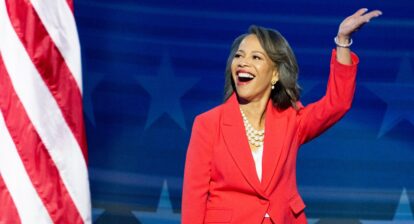
The New York Times reported Tuesday that the NFL league officials changed one of the expected slogans stenciled in the back of the end zone during Super Bowl LIX from “End Racism” to “Choose Love.” The NFL has been stenciling slogans in the back of end zones since 2021 as an extension of the Inspire Change social justice platform while the nation reeled after the murder of George Floyd by Minneapolis police officers.
According to NFL spokesperson Brian McCarthy, the league felt that “Choose Love” was an “appropriate statement for what the country has collectively endured given recent tragedies and can serve as inspiration.”
“When I talk to my guys, and I get a sense of what they care about–particularly this week–they have not been focused on who’s attending the game. They haven’t been focused on the signage on the field,” NFLPA Executive Director Lloyd Howell Jr. said to Darren Smith of KLKC Radio following his annual Super Bowl press conference.
It’s also important to know that the executive director of the NFLPA is responsible for framing issues that impact players, ensuring they understand their significance, and then advocating on their behalf—not just responding to the issues players raise.
So, while there’s no doubt there have been several tragic instances across the United States to start 2025, the same was true during the AFC and NFC Championship games. The AFC Championship end zone message was “Choose Love,” while the NFC Championship displayed “End Racism” in one of the end zones.
However, this marks a significant departure from just a few years ago, when NFL players Malcolm Jenkins and Anquan Boldin co-founded The Players Coalition in 2017, aiming to make an impact on social justice and racial equality. The Players Coalition partnered with the NFL’s Inspire Change platform in 2018.
“Love and justice are not mutually exclusive. While ‘Choose Love’ is a positive message, we can’t ignore the ongoing fight against systemic racism,” said Jenkins, a two-time Super Bowl champion, in a statement released to EBONY. “The progress we’ve seen–including the visibility of ‘End Racism’ at NFL games–didn’t happen by chance. It was the result of player-led sustained advocacy, hard conversations and ultimately a commitment from teams and the league.”
Despite Howell Jr.’s assertion that players aren’t focused on who will be in the stands, every player knows at least one person will be there: President Donald Trump.
It will be the first time the sitting president attends the Super Bowl. That may be hard to believe, but it makes sense when you consider the security logistics surrounding U.S. Homeland Security. Secretary Kristi Noem said this is “the biggest homeland security event that we do every year.” It’s harder to believe this particular president would be attending.
Not that Trump isn’t a fan of the game–he’s been linked to several different failed ownership bids in the last 30 years. In his first term, Trump constantly criticized NFL commissioner Roger Goodell and questioned the patriotism of Kenny Stills, Colin Kaepernick, and other NFL players who kneeled during the national anthem. Their protest was aimed to draw attention to police brutality.
Trump’s second term, so far, has been defined by sweeping rollbacks of DEI initiatives across the government and the private sector. Goodell said the NFL will not follow suit at his annual Super Bowl press conference, telling reporters, “We’re not in this because it’s a trend to get into it or a trend to get out of it. Our efforts are fundamental in trying to attract the best possible talent into the NFL both on and off the field.”
Per Howell Jr., there is an intent to put “forward-leaning inclusion messages” in prominent places around the Super Bowl, but restated, “When it comes to what dignitaries or presidents or whoever’s attending, our guys aren’t focused on that.”
“Addressing racism requires direct action,” Jenkins’ statement continued. “We can–and must–both continue the critical work of dismantling systemic racism and communicate that racism does not belong in our society.”
The NFL will be passing on an opportunity to show support for those direct actions on the biggest stage of the year, in the presence of Trump–one of the people most critical of its’ players’ social justice causes.



